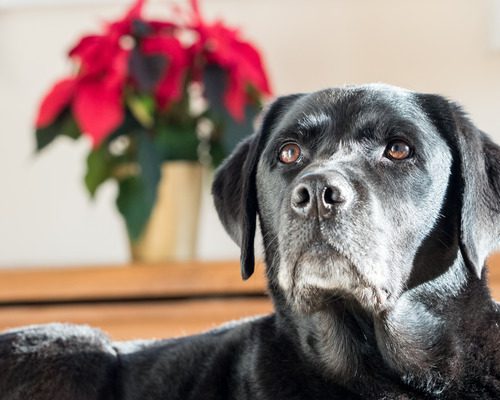Are Poinsettias Poisonous to Dogs?
Poinsettias are a popular holiday plant known for their vibrant red and green foliage. But as a pet owner, you might wonder, “Are poinsettias poisonous to dogs?” This article will provide a detailed look at how poinsettias affect dogs, what symptoms to watch for, and what steps to take if your dog encounters this festive plant. If you have any concerns about your pet’s health, call Pets Furst Urgent Care in Langhorne, PA at (215) 755-1000.

Understanding Poinsettias and Their Toxicity
Poinsettias (Euphorbia pulcherrima) are a common sight during the holiday season. Despite their beauty, many pet owners worry about their potential toxicity to dogs. The good news is that poinsettias are not highly toxic to dogs. However, they can still cause mild to moderate discomfort if ingested or if their sap comes into contact with your dog’s skin.
What Makes Poinsettias “Toxic”?
Poinsettias contain a milky white sap that can irritate a dog’s mouth and stomach if ingested. This sap contains compounds called diterpenoid euphorbol esters and saponin-like detergents. While these substances are not highly toxic, they can cause irritation and discomfort. The myth that poinsettias are deadly likely stems from the plant’s association with the Euphorbia family, which includes more toxic relatives.
Symptoms of Poinsettia Exposure in Dogs
If your dog has ingested part of a poinsettia plant or come into contact with its sap, you may notice some symptoms. It’s essential to recognize these signs to provide the appropriate care for your pet.
- Mild Irritation: Dogs may experience mild irritation in their mouth and stomach. This can result in drooling, vomiting, or diarrhea.
- Skin Irritation: Contact with the sap can cause redness, swelling, or itching on the skin or around the eyes.
- Eye Discomfort: If the sap gets into a dog’s eyes, it can cause redness, tearing, and discomfort.
While these symptoms are usually mild, they can be uncomfortable for your pet. In most cases, the symptoms will resolve on their own within a few hours.
When to Seek Veterinary Care
Most poinsettia-related issues are not severe. However, if your dog exhibits persistent vomiting, diarrhea, or significant discomfort, it’s best to consult with a veterinarian. Pets Furst Urgent Care in Langhorne, PA, can provide guidance and treatment if needed. Call (215) 755-1000 if you have any concerns.
Preventing Poinsettia Poisoning in Dogs
Prevention is always the best approach when it comes to keeping your pets safe. Here are some tips to help you prevent poinsettia poisoning in your dog.
- Keep poinsettias out of reach of your pets. High shelves or hanging baskets can help prevent your dog from accessing the plants.
- Train your dog to avoid indoor plants. Positive reinforcement can be effective in teaching your pet to stay away from certain areas.
- Consider using artificial poinsettias or other non-toxic plants to decorate your home during the holidays.
By taking these precautions, you can enjoy the beauty of poinsettias without risking your dog’s health.
Other Holiday Plants to Watch Out For
While poinsettias are relatively low-risk, other holiday plants can pose more significant threats to your dog’s health. It’s important to be aware of these plants and take steps to keep your pet safe.
- Holly: Holly berries and leaves contain saponins, which can cause vomiting, diarrhea, and drooling. The spiny leaves can also cause irritation if ingested.
- Mistletoe: Mistletoe contains toxalbumin and phoratoxin, which can lead to gastrointestinal upset, difficulty breathing, and in severe cases, cardiovascular problems.
- Pine Needles: Pine needles from Christmas trees can cause oral irritation and gastrointestinal upset if ingested. The needles can also puncture the digestive tract, leading to more severe complications.
- Tree Water: The water used to keep Christmas trees fresh can contain fertilizers, bacteria, and molds that are harmful to dogs if ingested.
By being aware of these plants and taking preventive measures, you can ensure a safe and happy holiday season for your dog.
What to Do if Your Dog Eats a Poinsettia
If your dog ingests a poinsettia, remain calm and follow these steps to ensure their safety and comfort. Take away any remaining plant material to prevent further ingestion. If your dog has ingested the plant or come into contact with its sap, gently rinse their mouth and any affected skin areas with water. Keep an eye on your dog for any signs of irritation or discomfort.
When to Call the Vet
If your dog exhibits severe symptoms or if you are concerned about their health, contact Pets Furst Urgent Care. It’s better to err on the side of caution and seek professional advice when needed.
Keeping Your Dog Safe During the Holidays
Poinsettias are a festive addition to holiday decor, but they can pose a mild risk to dogs. By understanding the potential symptoms and taking preventive measures, you can keep your pet safe during the holiday season. If you have any concerns about poinsettia poisoning or other holiday hazards, call Pets Furst Urgent Care in Langhorne, PA at (215) 755-1000. Their team is ready to provide the care and support your pet needs.
recent posts
About Us
At Pets Furst Urgent Care, your time is important to us. That’s why we’re here: To provide the highest level of pet urgent care possible on a walk-in basis. That means you can stop in at any time during our office hours to see a knowledgeable veterinarian.

